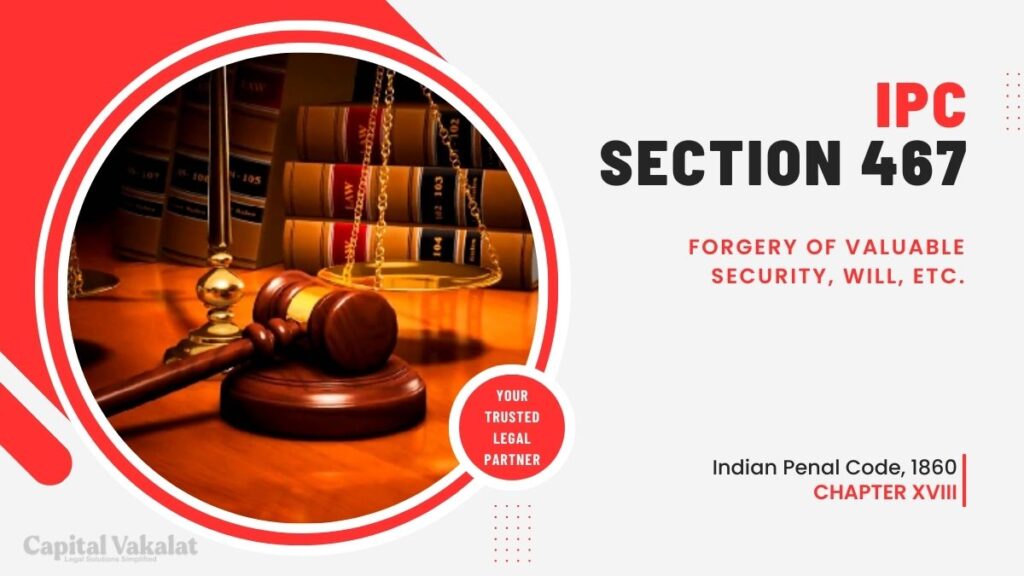Forgery is a deceptive art that transcends centuries, constantly adapting to the evolving nature of society. Section 467 of the Indian Penal Code (IPC) stands as a bulwark against one specific facet of forgery: the forgery of valuable security, will, etc.

This article delves into the depths of Section 467 IPC, exploring its historical roots, legal ramifications, challenges in prosecution, preventive measures, and real-life cases.
Definition of Section 467 IPC
Section 467 of the IPC explicitly addresses the offense of forging valuable securities, wills, and other vital documents. The provision aims to safeguard the integrity of legal and financial instruments, recognizing the potential harm that forgery can inflict on individuals and society.
Overview of Forgery of Valuable Security, Will, etc.
Forgery is a multifaceted crime, and when it involves valuable securities or wills, its repercussions can be particularly severe. This section provides a brief overview of the various scenarios covered under Section 467 IPC.
Historical Context
Evolution of Section 467 IPC
To comprehend the significance of Section 467, it’s crucial to trace its evolution. Exploring the historical context sheds light on the legislative intent behind its enactment and subsequent amendments.
Significance in Legal History
The inclusion of forgery-related provisions in legal codes has deep historical roots. Understanding the historical context helps in appreciating the ongoing battle against fraudulent activities.
Elements of Section 467 IPC
Understanding the Key Components
Section 467 delineates specific elements that constitute the offense. Unpacking these components provides clarity on the intricacies involved in proving an act of forgery under this provision.
Types of Valuable Securities and Wills Covered
The diversity of valuable securities and wills necessitates a closer look at the varying manifestations of forgery addressed by Section 467. This section categorizes and elaborates on the types of documents protected by the law.
Legal Consequences
Penalties for Violating Section 467 IPC
The legal repercussions for forgery under Section 467 are stern. This section outlines the penalties imposed, emphasizing the severity of the consequences to deter potential offenders.
Case Studies Illustrating Legal Outcomes
Real-life cases serve as poignant examples of the impact of Section 467 on individuals and communities. Analyzing these cases provides insights into the judicial interpretation and application of the law.
Challenges in Prosecution
Difficulties in Proving Forgery Cases
Forgery cases often present unique challenges in terms of evidence and witness testimony. This section explores the difficulties prosecutors face in establishing guilt beyond a reasonable doubt.
Notable Legal Precedents
Examining past legal precedents offers valuable insights into the nuances of forgery trials. Notable cases that have shaped the interpretation of Section 467 are discussed to understand the legal landscape.
Prevention and Safeguards
Measures to Protect Valuable Securities and Wills
Prevention is the first line of defense against forgery. This section outlines practical measures individuals and organizations can adopt to safeguard valuable securities and wills.
Importance of Document Authentication
The role of document authentication in preventing forgery cannot be overstated. This section underscores the significance of robust authentication processes in the digital age.
Technology and Forgery
The Role of Technology in Preventing or Facilitating Forgery
As technology advances, so do the methods of forgery. This section explores the dual role of technology, both as a tool for prevention and a potential catalyst for sophisticated forgery.
Emerging Trends in Forgery Detection
In the ongoing battle against forgery, technological advancements in detection methods are crucial. This section highlights the latest trends in forgery detection and their implications.
Real-life Cases
Highlighting Notorious Instances of Forgery under Section 467 IPC
Examining real-life cases brings to light the gravity of forgery offenses. This section narrates instances where forgery under Section 467 has had far-reaching consequences.
Impact on Individuals and Society
Beyond legal consequences, forgery has a profound impact on individuals and society at large. Understanding the broader implications emphasizes the societal need for stringent enforcement of Section 467.
Public Awareness
The Need for Educating the Public on Forgery Risks
A proactive approach to combating forgery involves educating the public. This section advocates for awareness campaigns to empower individuals to recognize and report potential forgery attempts.
Promoting Legal Literacy
Enhancing legal literacy is a fundamental step in fortifying society against forgery. This section explores initiatives to promote understanding of legal rights and responsibilities.
Conclusion
In conclusion, Section 467 IPC stands as a formidable deterrent against forgery of valuable securities, wills, and related documents. Its historical evolution, legal consequences, challenges in prosecution, preventive measures, and real-life cases collectively emphasize the need for vigilance and awareness.
Frequently Asked Questions
How can individuals protect themselves from forgery?
Adopting secure document storage practices, utilizing authentication features, and staying informed about the latest forgery trends are effective ways for individuals to protect themselves.
What role does technology play in preventing forgery?
Technology serves a dual role, acting as both a tool for prevention and a potential facilitator of forgery. Adopting advanced authentication technologies is crucial.
Are the penalties for forgery under Section 467 severe?
Yes, the penalties are stringent, reflecting the gravity of the offense. They include imprisonment and fines to deter individuals from engaging in forgery.
How can public awareness contribute to reducing forgery cases?
Public awareness campaigns can empower individuals to recognize and report forgery attempts, creating a collective effort to combat this crime.